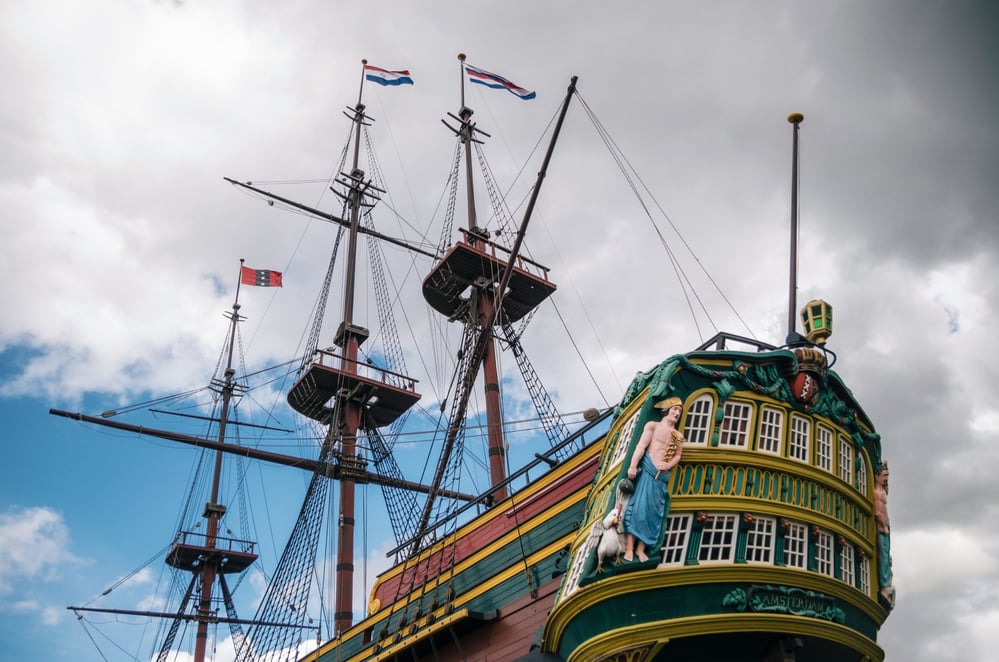Here’s something the Dutch don’t like to talk about: for a brief stretch of time in the 17th century, the Netherlands dominated the global slave trade over all other European empires.
Say, what?? The land of tolerance, liberation, and modernity used to be a European colonial superpower dabbling in slavery, exploitation and land grabs?
Yes, indeed. The Dutch did not publicly recognise their historical involvement until the late 1990s, almost 130 years after the abolishment of slavery in Dutch colonies.
What is it?
It’s not so much that the Dutch don’t talk about their colonial heritage at all, it’s just that the more inconvenient parts (cough, slavery, cough, violence) are left out.

Until recently, the Dutch colonial era was praised for bringing riches and cultural exchange to such a small country.
The Dutch Golden Age was built to a large part on the operations of the Dutch East India Company (VOC), which specialised in the trade of spices, sugar, coffee…oh, and slaves from Dutch colonies.
READ MORE | Keti Koti: the most significant Dutch holiday you’ve probably never heard of
Turns out, the Dutch Golden Age was not golden for everyone. Here are some facts that might give you a rough idea of what went down during the Dutch ‘Golden’ Age:
- The Dutch constituted 4.4% of the entire volume of documented slave exports from Africa, with about 500,000 enslaved Africans leaving the continent on ships under the Dutch empire’s flag.
- In stark numbers, the Dutch are estimated to be the fifth-largest trader of slaves in all of Europe, following Portugal, England, France and Spain.
- Dutch colonial governance tended to be bloody and repressive. From 1899 to 1909 alone, 22,000 Indonesians were killed under the rule of formerly celebrated Dutch coloniser J.B. van Heutsz.
- During the Indonesian Independence War (1945-1949), over 100,000 Indonesians died. The Dutch government only apologised for the “extreme violence” committed by the Dutch in the conflict for the first time in February 2022.
Okay, so, to wrap it up, the Dutch have committed horrific colonial atrocities like almost any other European Empire. But why don’t they talk about it?
Why do they do it?
There are different ways to explain why the Dutch are struggling to come to terms with the whole breadth of their colonial past.
For one, there seems to be a lot of shame involved. The acceptance of the Netherlands as a formerly-repressive colonial power clashes with Dutch self-identification as tolerant, modern, and fierce human rights defenders. After all, the Peace Palace is situated in The Hague for a reason.
Another argument says that the Dutch tend to identify as victims rather than perpetrators when examining their history. The Spanish occupation, followed by the Dutch revolt, and the time spent under Nazi occupation are key narratives that shape the idea of Dutch victimhood.
In fact, the Dutch seem to reject the idea of their colonialism to such an extent that some turn a blind eye — even if it’s right under their noses!
A good example is the Zwarte Piet controversy. Is Santa’s little helper representative of slavery, or is his skin just blackened from the chimney smoke? (Hint: it’s the former.)
Why is it quirky?
Even though the Dutch government has started officially recognising its colonial past by, for example, erecting public monuments commemorating slavery or taking down those of colonial governors — it’s not actually the Dutch that is driving this change.
Instead, it’s the descendants and governments of those who were affected by Dutch colonialism, such as the Surinamese or Indonesian communities, that are calling for recognition of their history.
Should you join in?
Nowadays, there are several initiatives that aim to illuminate the Dutch involvement in slavery, enslavement and colonial violence over the past couple of centuries.
If you’re interested in participating, you could attend the Keti Koti celebrations that take place on July 1 every year to celebrate the abolition of slavery in the Dutch East Indies.
Otherwise, read up on the Dutch involvement in enslavement and slavery! There are plenty of resources out there, and more and more discoveries are being made.
What do you think of this Dutch quirk? Have you experienced it? Tell us in the comments below!

” the Dutch are estimated to be the fifth-largest trader of slaves in all of Europe, following Portugal, England, France and Spain.”
Ok. So how did they size up compared to African slave traders?
To further illustrate. You write: “the Dutch have committed horrific colonial atrocities like almost any other European Empire”
Why are you pushing this bias against Europe specifically? Practically every single nation in the world was practicing slavery at the time. African countries were selling their own black people into slavery to Europe. African countries forced white slaves from Europe to work. You seem very insistent on making it sound like Europe was bad and the rest of the world was innocent. This kind of framing a narrative is dangerous.
You know, rewriting history, white privilege, and more of those American nonsense. Sickening